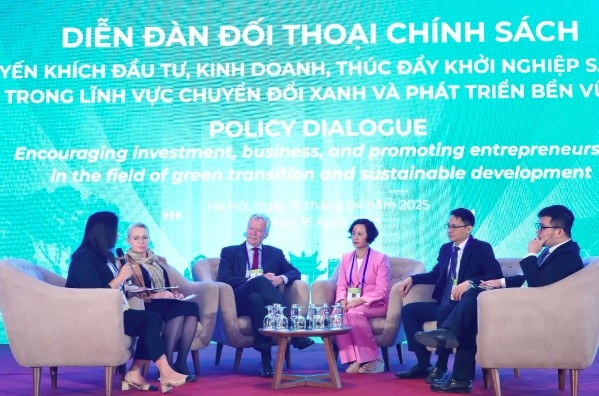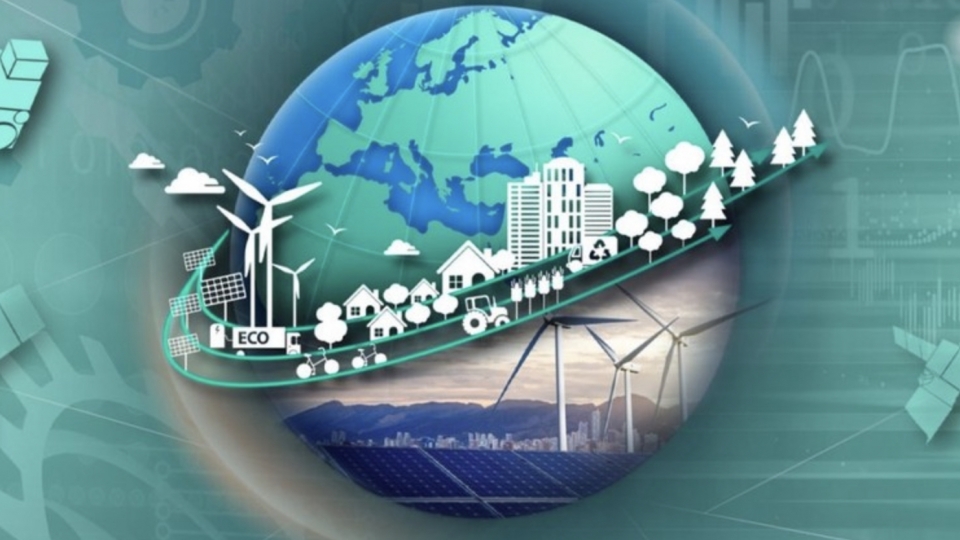Policy Dialogue Forum promotes green startups for sustainable development
VOV.VN - On the morning of April 16 in Hanoi, the Ministry of Science and Technology hosted a Policy Dialogue Forum on promoting investment, business, and innovative startups in green transition and sustainable development.

The event, part of the P4G Vietnam 2025 Summit held from April 14–17, gathered more than 300 participants.
Speaking at the forum, Deputy Minister of Science and Technology Hoang Minh emphasized that the event demonstrates Vietnam's strong commitment to working with the international community toward a harmonious balance between economic growth and environmental protection. He noted that green growth is not only a goal but also a driver for sustainable development.
According to the Deputy Minister, the world is facing major challenges such as climate change, resource depletion, and environmental pollution. Promoting sustainable business models, green innovation, and low-carbon, circular economic transformation is now an urgent priority.
In Vietnam, the Party and State have identified green growth as a core development strategy, shown in various policies supporting innovative startups, circular economy models, and green technology transfer. These efforts lay the foundation for a wave of startups in renewable energy, environmental technology, sustainable agriculture, and emission-reduction solutions, thereby contributing to Vietnam’s commitment to net-zero emissions by 2050.
Vietnam is currently home to over 4,000 innovative startups, including two unicorns valued at over US$1 billion and 11 companies worth more than US$100 million, and more than 1,400 startup support organizations. Of these, about 200–300 startups are focused on green transition, accounting for 5–7% of the total.

He called for joint efforts from the public and private sectors, as well as international organizations, to build an effective and sustainable green startup ecosystem, stating: “We are standing at a great opportunity to shape a greener future for Vietnam and the world. Innovation and cooperation are the keys to tackling environmental challenges and advancing the circular economy.”
Pham Hong Quat, Director of the Department of Market and Business Development under the Ministry of Science and Technology, said that Vietnamese startups are making progress in green technology development. However, they still face numerous difficulties in terms of finance, lack of clear legal frameworks, and shortages of skilled workers in circular economy, carbon management, and biotechnology. Although consumers are increasingly interested in green products, price and consumption habits remain major barriers.
He proposed developing a map of the green startup ecosystem and a set of impact indicators that measure environmental, social, and economic performance of green tech businesses. He also underlined the need to strengthen connections between universities, research institutes, and enterprises, while boosting green consumption awareness among the public.
At the forum, Dr. Malle Fofana, Asia Director & Head of Programs at Global Green Growth Institute of the Global Green Growth Institute (GGGI), said the demand for climate action is rising, while 75% of global green technologies are still at early stages. He stressed the need to turn these into practical solutions, especially in high-emission sectors such as heavy industry, where only 11% of waste is treated with clean technologies despite accounting for 35% of emissions.
He also highlighted the role of artificial intelligence (AI) in dealing with climate challenges and called for positioning climate technologies as a legacy for future generations. According to him, cooperation between governments, businesses, investment funds, and international organizations is crucial to supporting startups in developing climate tech.
The forum also featured an open discussion titled “Partnerships for promoting innovative startups in green transition and sustainable development,” bringing together startups, investors, and support organizations to explore public–private cooperation and resource mobilization for green transition.



